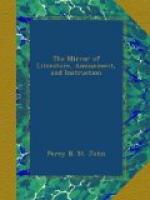Yet mourn not, wanderers—onto
you a thrilling hope is given,
A tabernacle unconfin’d, an endless
home in heaven!
And though ye are divided now, ye shall
be made as one
In Eden, beauteous as the skies that o’er
your childhood shone!
Deal.
REGINALD AUGUSTINE.
* * * * *
A CHAPTER ON KISSING.
BY A PROFESSOR OF THE ART.
(For the Mirror.)
“Away with your fictions of flimsy
romance,
Those tissues of falsehood
which folly has wove;
Give me the mild gleam of the soul breathing
glance,
And the rapture which dwells
in the first kiss of love.”
BYRON.
There is no national custom so universally and so justly honoured with esteem and respect, “winning golden opinions from all sorts of people,” as kissing. Generally speaking, we discover that a usage which finds favour in the eyes of the vulgar, is despised and detested by the educated, the refined, and the proud; but this elegant practice forms a brilliant exception to a rule otherwise tolerably absolute. Kissing possesses infinite claims to our love, claims which no other custom in the wide world can even pretend to advance. Kissing is an endearing, affectionate, ancient, rational, and national mode of displaying the thousand glowing emotions of the soul;—it is traced back by some as far as the termination of the siege of Troy, for say they, “Upon the return of the Grecian warriors, their wives met them, and joined their lips together with joy.” There are some, however, who give the honour of having invented kissing to Rouix, or Rowena, the daughter of Hengist, the Saxon; a Dutch historian tells us, she, “pressed the beaker with her lipkens (little lips,) and saluted the amorous Vortigern with a husgin (little kiss,)” and this latter authority we ourselves feel most inclined to rely on; deeply anxious to secure to our fair countrywomen the honour of having invented this delightful art.
Numberless are the authors who have written and spoken with rapture on English kissing.
“The women of England,” says Polydore Virgil, “not only salute their relations with a kiss, but all persons promiscuously; and this ceremony they repeat, gently touching them with their lips, not only with grace, but without the least immodesty. Such, however, as are of the blood-royal do not kiss their inferiors, but offer the back of the hand, as men do, by way of saluting each other.”




